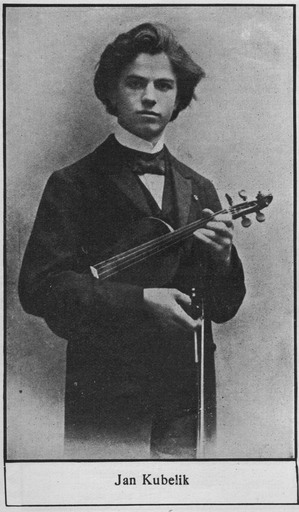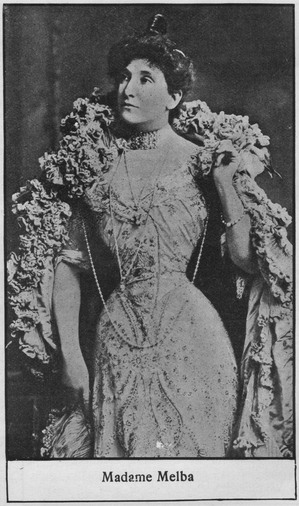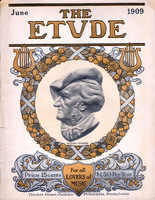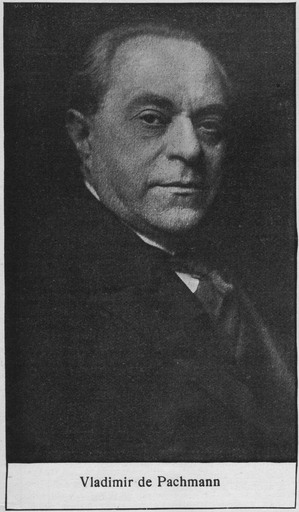 VLADIMIR DE PACHMANN.
VLADIMIR DE PACHMANN.
(Pahk-man.)
De Pachmann was born at Odessa, Russia, July 27, 1848. His father was a Professor at the University and had considerable reputation as an amateur violinist. He had, when in Vienna, been on friendly terms with Beethoven and Weber. Vladimir studied under his father until he was eighteen, when he went to the Conservatory of Vienna. He studied under Professor Dachs. He obtained the gold medal in 1869, and returned to Russia, where he made his debut. He was very successful, but was not himself satisfied with his own work. He retired for a further period of study, which lasted eight years. De Pachmann then appeared with great success in Berlin and Leipsic and elsewhere, but still felt he had more to learn. He accordingly gave up two more-years to study. He then gave three Concerts in Vienna, three in Paris, and made his London debut. In these he was brilliantly successful, and at last satisfied his own exacting demands. His success was maintained in America, and De Pachmann is still one of the most popular pianists of the day. His taste in music is eclectic, but his name has come to be closely identified with the works of Chopin. His genius is somewhat marred by his eccentricities. He is somewhat given to make remarks as to the excellence of his playing while performing, and to commenting audibly on the heated condition of the concert room, and such like matters, but in spite of his weaknesses, and often amusing vanities, he possesses a wonderfully poetic nature.
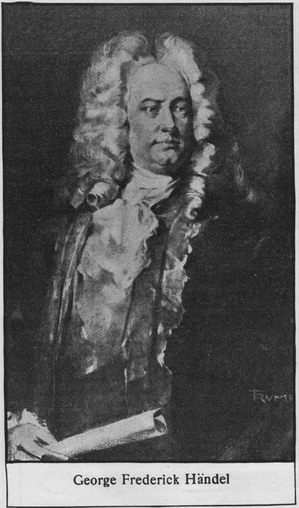 GEORGE FREDERICK HÄNDEL.
GEORGE FREDERICK HÄNDEL.
(Popularly Handel, properly Hayndel.)
Händel was born at Halle, Lower Saxony, Feb. 23, 1685, and died in London, April 14, 1759. His father, an elderly surgeon, was opposed to his study of music, but through the influence of the Duke of Saxe Weissenfels he was placed under Zachau, from whom he learned composition, violin, clavichord and organ. After a brief appointment as organist in Halle, he went, in 1706, to Hamburg, where he became conductor at the opera house. In 1706 he visited Italy. On his return he was appointed capellmeister to the Elector of Hanover, afterwards George I of England. Attracted to London, Händel overstayed his leave. He reluctantly returned to Hanover, but offended his royal master by again returning to London. It was at this time that George succeeded to the English throne, and affairs were only adjusted between the monarch and the genius by the charm of Händel’s “Water Music,” which was produced at a water festival on the Thames. From that time on Händel became the most prominent musician in London. He was acknowledged as the greatest organist of his day; was successful as an opera producer, and a conductor as well as composer; and could dominate the most erratic of prima donnas and tenors. In his 54th year, he tired of court intrigues and Italian opera, and took to composing oratorio for the people. He met with tremendous success in his “The Messiah,” which was produced in Dublin in 1742. In his declining years Händel was afflicted by blindness.
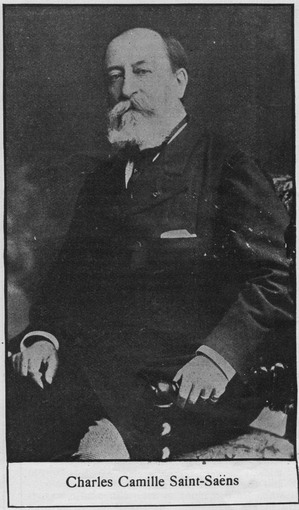 CHARLES CAMILLE SAINT- SAËNS.
CHARLES CAMILLE SAINT- SAËNS.
(Sangh-sahn.)
Saint-Saëns was born in Paris, Oct. 9, 1835. He early showed great aptitude for music, his mother and his aunt being his first instructors. He still keeps the piano on which he had his first lessons. He studied piano under Stamaty, theory under Maledon, and under Benoist for organ. At the Conservatoire he studied composition under Gounod, Reber and Halèvy. He commenced his musical career as an organist, and at one time held a post at the Madeleine, but in 1870 he gave up this work in order to devote himself to composition. At that time also he commenced touring and giving concerts in all the chief European musical centers. He has been a great traveler, and has earned and won a great reputation both as pianist and conductor. It is chiefly, however, by his ability as a composer that he has won his high distinction, and Saint-Saëns has written much in all styles. Among his piano pieces, the first mazourka is the composition most familiar perhaps to students, while many arrangements of his “Danse Macabre” are performed. His church music is in demand, and his chamber music is exceedingly beautiful. “Samson and Delilah” is the best known of his operas. He is at his best in writing for orchestra, and he has been called a close disciple of Berlioz, but is without the latter’s extravagance. Saint-Saëns stands midway between the older classic schools and the modern romantic style.
Kubelik was born at Michle, near Prague, July 5, 1880. His father, though only a humble market gardener, was, like most Bohemian Czechs, a good musician, and played many instruments. He also conducted orchestras for festive occasions. He soon recognized his son’s remarkable talent, and when Jan was five years old he commenced to give him a good foundation in the art of violin playing. Young Kubelik made rapid advancement, and in 1888 made his first public appearance in Prague. In 1892 he went to the conservatory in that city, and was fortunate enough to be placed under the care of Sevcik, the renowned teacher, (sic) Thanks to the splendid teaching of this able man, Kubelik graduated from the conservatory in 1898, and at his final students’ concert he played Paganini’s D major concerto with such brilliant technic as to win recognition as a vituoso (sic) of the highest rank from the examiners and critics. Unhappily for him, his father died just as his career was commencing, and he was left to provide for the family. A brilliant success in Vienna, however, enabled him to look after the material needs of his family, and at the same time established his reputation. After appearing in Budapest, he went to Italy in 1900, where he was accorded the highest honors. He continued his brilliant career throughout the Continent, including Paris. In London his success was phenomenal, and he was regarded as a second Paganini. His first appearance in this country was in 1902-03.
Melba (Nellie Porter Armstrong) was born May 19, 1859, at Burnley, near Melbourne, Australia. She early showed great talent for music, and made her debut as a singer in Melbourne Town Hall at the age of six. She received instruction in piano, composition and harmony at the local church, where she frequently played the organ. Her father, David Mitchell, a Scotch contractor, objected to her undertaking a musical career, and it was not until her marriage to Captain Charles Armstrong, in 1882, that the young soprano finally decided as to her future. In 1886 she went to Europe, and after a single concert in London, went to Paris to study under Marchesi. After a year’s hard work she made her debut in opera at Brussels under the name of “Melba,” obviously derived from her birthplace. She achieved a brilliant success, and was almost immediately engaged by Sir Augustus Harris to appear at Covent Garden. She was at once acknowledged as in the front rank of singers, though her lack of experience hindered her a little. From that time on, however, Melba made great strides, and has now become one of the foremost singers of the day, and shares with Tetrazzini the highest possible operatic distinctions. She has appeared in many lands with the greatest success. Her first visit to America was paid in 1893, when she made her debut with the De Reszkes at the Chicago World’s Fair. Her voice is remarkable for its freshness, evenness, and “silvery” quality throughout its entire compass (B flat to F”’).
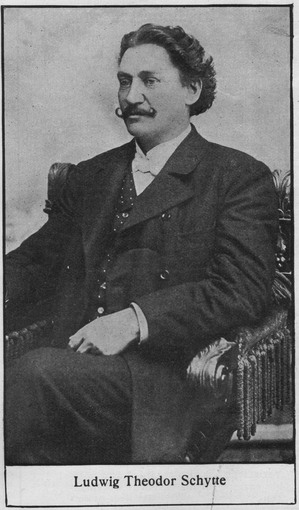 LUDWIG THEODOR SCHYTTE.
LUDWIG THEODOR SCHYTTE.
(Skittay.)
Schytte was born at Aarhus, Jutland, Denmark, April 28, 1850. He did not originally intend to adopt a musical career, but commenced life as a chemist. In 1870, however, he found that he preferred music to medicine and studied piano under Anton Rée, and Edmund Neupert. For composition he went to Gebauer and Gade. Finally he departed to Berlin, where he studied under Taubert, and eventually he went to Liszt at Weimar. Schytte was appointed head of an advanced piano class at Horàk’s Academy in Vienna, where he remained from 1887 to 1888. Since that time he has continued to reside in the Austrian capital, and has won distinction as pianist, teacher, and composer. It is in the latter capacity, of course, that his name is most familiar to Etude readers, and his delightful, melodious music is steadily gaining in popularity. His “Vivandiére,” and the beautiful “Vienna” waltz readily occur to the mind as excellent examples of his piano writing. He has also composed a considerable amount of chamber music of a more elaborate character, and has a concerto for piano and orchestra which was favorably received. He wrote a comic opera, “Eahrendes Volk,” which, however, failed to obtain a hearing. His one-act opera, “Hero,” was more successful and was produced in Copenhagen in 1898, and his operetta, “Der Mameluk,” obtained a hearing in Vienna in 1903. His song cycle “Die Verlassene,” is also regarded as a notable example of his excellent workmanship.


